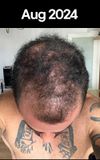community 2.5 years on finasteride, minoxidil, and Nizoral - before and after
The progress made by someone using finasteride, minoxidil and Nizoral for hair loss over a 2.5 year period, with before and after photos to show the results. Replies included encouragements and questions about the treatments used.

